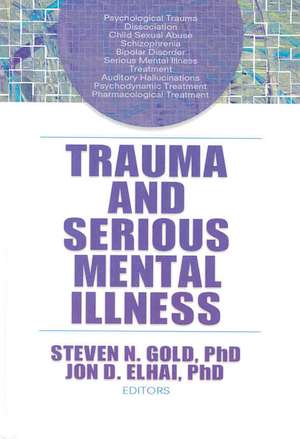Trauma and Serious Mental Illness
Editat de Steven N. Gold, John D. Elhaien Limba Engleză Hardback – 25 mar 2008
For decades, the idea that serious mental illnesses (SMIs) are almost exclusively biologically-based and must be treated pharmacologically has been commonplace in psychology literature. As a result, many mental health professionals have stopped listening to their clients, categorizing their symptoms as manifestations of neurologically-based disturbed thinking. Trauma and Serious Mental Illness is the groundbreaking series of works that challenge this standard view and provides a comprehensive introduction to the emerging perspective of SMIs as trauma-based. This unique collection illustrates how different psychotherapy approaches can lead to reduced symptomatology, decreased psychological distress, and improved functioning in individuals living with SMIs.
Each extensively-referenced chapter in Trauma and Serious Mental Illness offers mental health workers a forward-looking theoretical inquiry, empirical study, or critical treatise providing compelling counter evidence to challenge the widespread belief that SMIs are not reactions to the extreme and extremely disturbing circumstances embodied by psychological trauma. In addition to the etiological application, this revealing text proposes ways to incorporate this cutting-edge approach toward treatment options as well.
Contributors to Trauma and Serious Mental Illness suggest that:
- childhood trauma is related to psychotic disorders
- dissociation can be confounded with psychotic symptoms
- auditory hallucinations can be diagnostic of dissociation rather than psychosis
- psychosis is related to the quality of family of origin environment and to age of onset of childhood abuse
- bipolar and trauma-related disorders sometimes overlap
- individuals with SMIs suffer related trauma even in treatment facilities
- and much more!
Preț: 720.70 lei
Preț vechi: 876.45 lei
-18% Nou
Puncte Express: 1081
Preț estimativ în valută:
137.100€ • 142.35$ • 114.37£
137.100€ • 142.35$ • 114.37£
Comandă specială
Livrare economică 30 ianuarie-13 februarie
Doresc să fiu notificat când acest titlu va fi disponibil:
Se trimite...
Preluare comenzi: 021 569.72.76
Specificații
ISBN-13: 9780789036506
ISBN-10: 0789036509
Pagini: 168
Dimensiuni: 152 x 229 x 18 mm
Greutate: 0.43 kg
Ediția:1
Editura: Taylor & Francis
Colecția Routledge
Locul publicării:Oxford, United Kingdom
ISBN-10: 0789036509
Pagini: 168
Dimensiuni: 152 x 229 x 18 mm
Greutate: 0.43 kg
Ediția:1
Editura: Taylor & Francis
Colecția Routledge
Locul publicării:Oxford, United Kingdom
Public țintă
Professional Practice & DevelopmentCuprins
Gold, Trauma and Serious Mental Illness: Is the Pendulum About to Swing? Conceptual Frameworks. Hammersley, Read, Woodall, Dillon, Childhood Trauma and Psychosis: The Genie is Out of the Bottle. Ross, Dissociation and Psychosis: Conceptual Issues. Moskowitz, Corsten, Auditory Hallucinations: Psychotic Symptom or Dissociative Experience? Empirical Studies. Faust, Stewart, Impact of Child Abuse Timing and Family Environment on Psychosis. Grubaugh, Cusack, Yim, Knapp, Frueh, Gender Differences in Relationship Patterns Between Adverse Psychiatric Experiences, Lifetime Trauma, and PTSD. Clinical Applications. Levy, The Broad Relationship Between Bipolar Disorder and Disorders of Psychological Trauma: Time-limited to Life-long Need for Mood Stabilizers. Karon, Trauma and Schizophrenia. Index. Reference Notes Included.
Descriere
For decades, the idea that serious mental illnesses (SMIs) are almost exclusively biologically-based and must be treated pharmacologically has been commonplace in psychology literature. As a result, many mental health professionals have stopped listening to their clients, categorizing their symptoms as manifestations of neurologically-based disturbed thinking. Trauma and Serious Mental Illness is the groundbreaking series of works that challenge this standard view and provides a comprehensive introduction to the emerging perspective of SMIs as trauma-based. This unique collection illustrates how different psychotherapy approaches can lead to reduced symptomatology, decreased psychological distress, and improved functioning in individuals living with SMIs.
